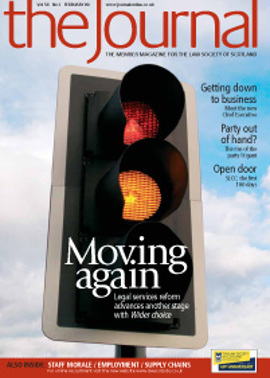Offer you can't refuse

The Pensions Act 2008 received Royal Assent on 26 November 2008 and substantially reforms the private pension system in Scotland and England & Wales. When the Act comes into force in 2012, all eligible workers who are not already members of a qualifying pension scheme will be automatically enrolled into a pension scheme by their employer.
The foundation of the Act was the Government’s white paper, Personal Accounts: a new way to save, published in December 2006. This highlighted that an estimated 7,000,000 people were not saving enough for their retirement and concluded that a voluntary approach to saving was unlikely to change people’s behaviour.
Automatic enrolment
From 2012, all eligible workers (those aged from 22 years to state pension age and who earn more
than £5,035 per annum) must be automatically enrolled into a qualifying workplace pension scheme or the new national pension savings vehicle known as the Personal Accounts Scheme (the “PAS”). Enrolment must occur on the first day of work, and where a worker is under 22 or earns less than £5,035, the obligation is triggered when they turn 22 or if their earnings rise above this threshold. Albeit an eligible worker will be automatically enrolled into a pension scheme or the PAS, they will have the option to opt out. However, they must be automatically re-enrolled after three years and have the option to opt out again.
Compulsory contributions
Contributions will be based on a band of earnings between £5,035 and £33,540 and indexed each year in line with earnings growth. A minimum of 8% of a worker’s overall earnings, which includes overtime, bonuses and commissions, must be paid into a scheme. Workers will be required to contribute a minimum of 4% of their earnings and the employer must contribute a minimum of 3%. The Government, through tax relief, will also contribute 1%. The 3% employer contribution will be subject to a phased implementation period of 1% in the first year, 2% in the second and 3% in the third. Where a worker exercises their right to opt out, no contributions need to be paid by the employer.
Qualifying schemes
Where the employer plans to enrol employees automatically in their existing or newly set-up occupational pension scheme, they will have to check that it satisfies the qualifying scheme requirements. In the case of defined contribution schemes this will be based on satisfying the compulsory contribution requirements; in relation to defined benefit schemes, the only requirement is that a contracting-out certificate is held where the worker is in contracted-out employment. Where the worker is not in contracted-out employment, the scheme must satisfy the test scheme standard by providing a pension for life with up to 40 years of accruals at a rate of at least 1/120ths.
Personal Accounts Scheme
vThe PAS is designed to provide a low cost independent pension scheme for those on low to middle incomes and will be established by secondary legislation. The PAS will be a defined contribution occupational pension scheme with a contribution limit of £3,600 per year and a general ban on transfers in and out of the scheme. The Personal Accounts Delivery Authority, established under the Pensions Act 2007, now has the function of giving assistance and advice to the Secretary of State in connection with the establishment and operation of the PAS.
Sanctions
If an employer contravenes any of the provisions of the Act, the Pensions Regulator has power to issue compliance notices and penalty notices. Compliance notices require the employer to remedy contraventions of the Act and penalty notices can attract fines of up to £50,000. The Act also contains provisions which prohibit employers from offering inducements or forcing workers to opt out of an occupational pension scheme or the PAS.
Comment
When fully in force the Act will provide an option to save towards retirement that was simply unavailable under prior legislation. However, it is not all good news as employers may see the Act as a further tax on their business. Given that temporary, part time and seasonal workers will also be caught by the Act, it is highly likely that employers will incur greater costs, especially where they currently make little or no pension provision. Even though the Act will not apply until 2012, employers should be preparing for it now, and such additional costs should also be factored in to their business plans going forward.
In this issue
- Cross-border disputes: new rules
- Beyond the downturn
- Take a business view
- Amber alert
- ARTL - time to reflect
- Jack to the future
- Party time
- Head of steam
- Big names for Society's big date
- Employment: without prejudice
- Simple steps
- Taken on credit
- Positive returns
- Electrical storm on the horizon?
- What's on file?
- Ask Ash
- New cases, old problems
- Fair sharing of less
- Beware - simpler rules
- Shifting sands
- Offer you can't refuse
- Website review
- Book reviews
- Weakest link
- Servitudes - new ground?






